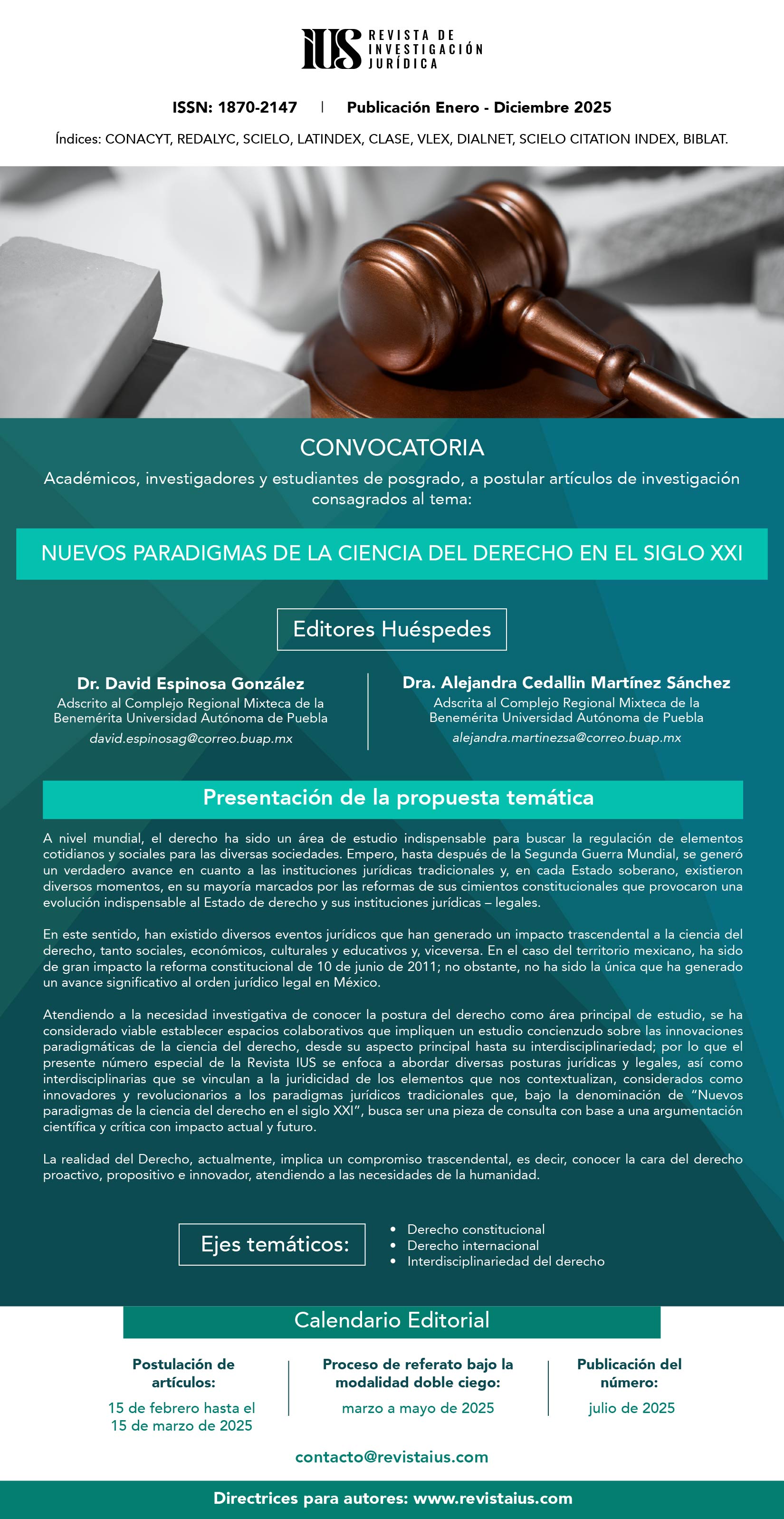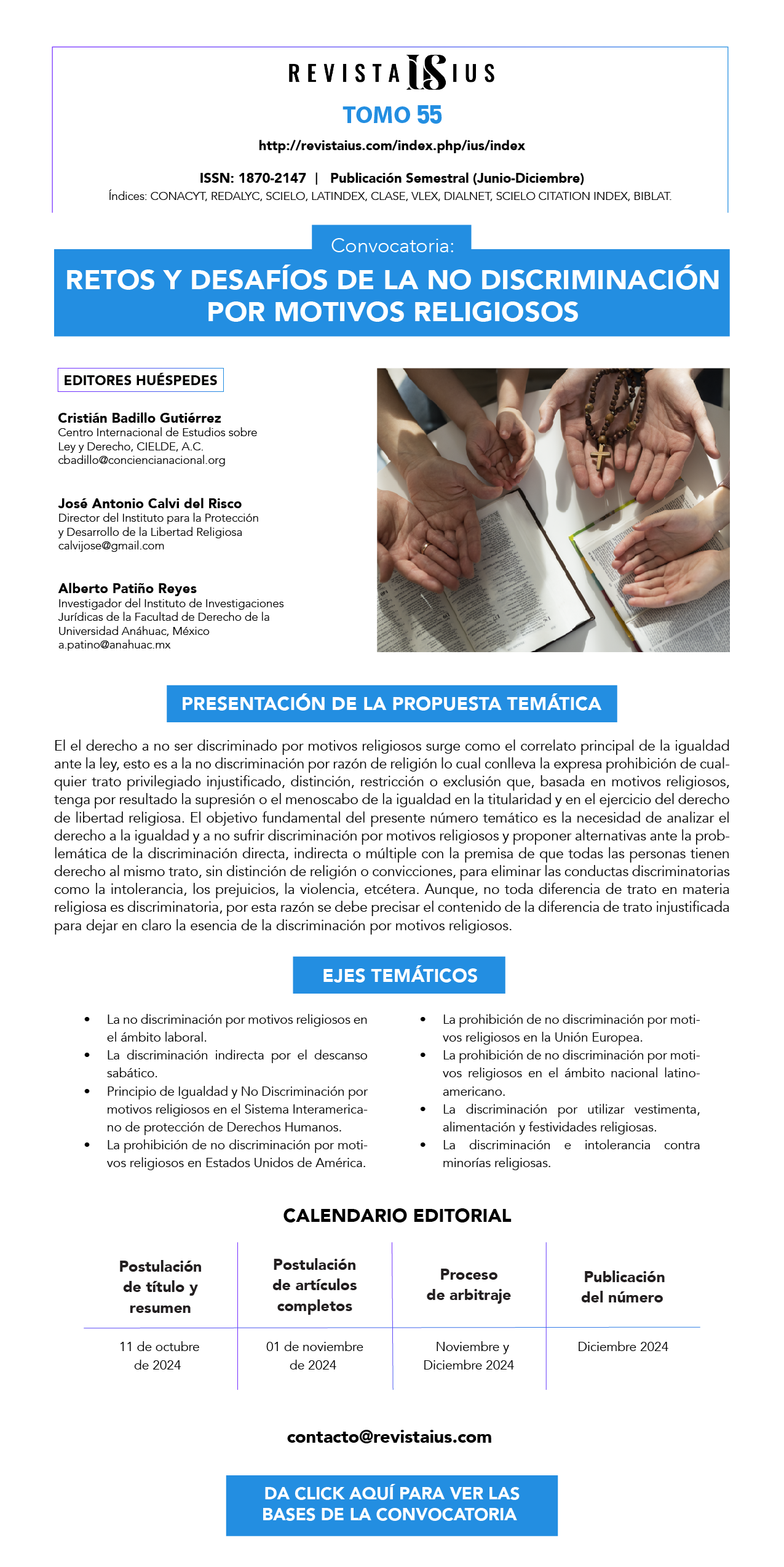La inviolabilidad de archivos nos conduce a una alternativa sin salida?
DOI:
https://doi.org/10.35487/rius.v11i40.2017.342Palabras clave:
Confidencialidad, lucha contra la corrupción, violaciones de derechos humanos, organizaciones internacionales.Resumen
A diferencia de la novela de Joseph Heller ‘Trampa 22’, la situación ilógica o paradójica que surge del privilegio de inviolabilidad de los archivos dentro de la cooperación de organizaciones internacionales con autoridades nacionales en el marco de la lucha contra el fraude y la corrupción es uno de los diferentes órdenes jurídicos que no necesariamente están alineados desde el principio. Las autoridades nacionales tienen que respetar la inviolabilidad de los archivos de organizaciones internacionales y no pueden ni interpretar el privilegio de manera restrictiva, sin tomar en cuenta al mismo tiempo su propósito, que es la operación ordenada e independiente de las organizaciones internacionales; y tampoco limitar el privilegio de alguna otra manera. Por lo tanto, queda en manos de las organizaciones internacionales en sí mismas el limitar el riesgo de una situación de Trampa 22, al cumplir con su deber de cooperar con autoridades nacionales. Sin embargo, la carga de la prueba no solo recae en las
organizaciones internacionales. Cualquier uso razonable del privilegio presupone que las autoridades nacionales reconocen su existencia y la abordan de manera respetuosa.
Descargas
Citas
Articles of Agreement of the International Bank for Reconstruction and Development, UNTS, vol. 2, p. 13.
Articles of Agreement of the International Development Agency, UNTS, vol. 439, p. 249.
Carpanelli, Elena, “On the Inviolability of Diplomatic Archives and Documents: The 1961 Vienna Convention on Diplomatic Relations to the Test of Wikileaks”, Rivista di diritto internazionale, vol. 98, 2015, p. 834.
Charter of Fundamental Rights of the European Union, OJ C 202, 7.6.2016, p. 389.
Convention on the Privileges and Immunities of the United Nations, UNTS, vol. 1, p. 15.
Court of Appeal for England and Wales, R. (Bancoult) v. Secretary of State for Foreign and Commonwealth Affairs (No. 3), 2014 EWCA Civ 708, 1 W.L.R. 2921.
Court of Justice of the European Union, Judgment of 17 June 1981, Case 113/80, Commission v. Ireland, EU:C:1981:139.
Daher, Ayman & Sarhan, Alan, “World Bank Group v Wallace: International Organizations’ Immunities and their Involvement in the Fight Against Corruption”. Disponible en: http://www.brettonwoodslaw.com/world-bank-group-v-wallace-international-organizations-immunities-and-their-involvement-in-the-fight-against-corruption.
Decision of the European Central Bank of 4 March 2004 on public access to European Central Bank documents, OJ L 80, 18.3.2004, p. 42.
European Court of Human Rights, Judgment of 18 February 1999, Beer and Regan v. Germany, Merits, App No 28934/95, echr 6, 1999.
European Court of Human Rights, Judgment of 18 February 1999, Waite and Kennedy v. Germany, Merits, App No 26083/94, echr 13, 1999.
Herdegen, Matthias, “Interpretation in International Law”, en Rüdiger Wolfrum (ed.), Max Planck Encyclopedia of Public International Law. Disponible en: http://opil.ouplaw.com
Inter-American Court of Human Rights, Judgment of 25 November 2003, Myrna Mack Chang v. Guatemala, Series C, No. 101.
Inter-American Court of Human Rights, Judgment of 29 November 2006, La Cantuta v. Peru, Series C, No. 162.
Inter-American Court of Human Rights, Judgment 26 September 2008, Tiu Tojín v. Guatemala, Series C, No. 190.
Inter-American Court of Human Rights, Judgment of 23 November 2009, Radilla Pacheco v. Mexico, Series C, No. 209.
Inter-American Court of Human Rights, Judgment of 24 November 2010, Gomes Lund et al. v. Brazil, Series C, No. 219.
Möldner, Mirka, “International Organizations or Institutions, Privileges and Immunities”, en Rüdiger Wolfrum (ed.), Max Planck Encyclopedia of Public International Law. Disponible en: http://opil.ouplaw.com
Muller, Alexander Samuel, International Organizations and their Host States, Aspects of their Legal Relationship, La Haya, Kluwer, 1994.
Muller, Alexander Samuel, “Immunities of icty Staff Members, Assets and Archives before the icty”, en Richard May, et al. (eds.), Essays on icty Procedure and Evidence in Honour of Gabrielle Kirk McDonald, La Haya, Kluwer, 2001, p. 439.
Orakhelashvili, Alexander, “State Immunity in National and International Law: Three Recent Cases Before the European Court of Human Rights”, Leiden Journal of International Law, vol. 15, 2002, p. 703.
Proposal for a Council Regulation on the establishment of the European Public Prosecutor’s Office, com (2013) 534 final.
Protocol on the Privileges and Immunities of the European Union, OJ C 202, 7.6.2016, p. 266.
Regulation (ec) No. 1049/2001 of the European Parliament and of the Council of 30 May 2001 regarding public access to European Parliament, Council and Commission documents, OJ L 145, 31.5.2001, p. 43.
Regulation (eu, Euratom) No. 883/2013 of the European Parliament and of the Council of 11 September 2013 concerning investigations conducted by the European Anti-Fraud Office (olaf) and repealing Regulation (ec) No. 1073/1999 of the European Parliament and of the Council and Council Regulation (Euratom)No. 1074/1999, OJ L 248, 18.9.2013, p. 1.
Supreme Court of Canada, World Bank Group v. Wallace, 2016, scc 15, 2016 1 S.C.R. 207. Disponible en: https://scc-csc.lexum.com/scc-csc/scc-csc/en/item/15915/index.do
Vienna Convention on Diplomatic Relations, UNTS, vol. 500, p. 95.
Vienna Convention on Consular Relations, UNTS, vol. 596, p. 261.
Vienna Convention on the Law of the Treaties, UNTS, vol. 1155, p. 331.
Wickremasinghe, Chanaka, “International Organizations or Institutions, Immunities before National Courts”, en Rüdiger Wolfrum (ed.), Max Planck Encyclopedia of Public International Law. Disponible en: http://opil.ouplaw.com
Wolfrum, Rüdiger, “Cooperation, International Law of”, en Rüdiger Wolfrum (ed.), Max Planck Encyclopedia of Public International Law. Disponible en: http://opil.ouplaw.com
Descargas
Publicado
Número
Sección
Licencia
Revista IUS por el Centro Internacional de Estudios sobre Ley y Derecho. se distribuye bajo una Licencia Creative Commons Atribución-NoComercial-CompartirIgual 4.0 Internacional.
Autorizamos a sus colaboradores a que suban una copia de sus trabajos publicados en sus webs personales o en cualquier repositorio de acceso abierto, siempre y cuando se mencione específicamente a la Revista IUS como fuente original de procedencia, citando el año y número del ejemplar respectivo y añadiendo el enlace a la página web donde este órgano editorial puede ser consultado in toto, de manera abierta y gratuita en: http://www.revistaius.com
Las y los lectores tienen libertad para:
Compartir, copiar y redistribuir el material en cualquier medio o formato.
El licenciante no puede revocar estas libertades en tanto usted siga los términos de la licencia.
De acuerdo con los siguientes términos:
Atribución: El lector debe reconocer el crédito de una obra de manera adecuada, proporcionar un enlace a la licencia, e indicar si se han realizado cambios. Puede hacerlo en cualquier forma razonable, pero no de forma tal que sugiera que tiene el apoyo del licenciante o lo recibe por el uso que hace.
No comercial: El lector no puede hacer uso del material con fines comerciales.
Si remezcla, transforma o crea a partir del material, deberá difundir sus contribuciones bajo la misma licencia que el original.
Cargos por gestión de artículos
Revista IUS no cobra tarifas por recibir, procesar o publicar los artículos (Article Processing Charge [APC]) enviados por los autores.





